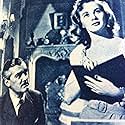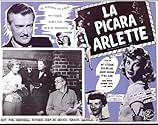Füge eine Handlung in deiner Sprache hinzuArlette is a malicious schoolgirl who uses her feminine charms to attract, and then destroy, every man gullible enough to respond to her flirtations. She sets her cap for the art professor a... Alles lesenArlette is a malicious schoolgirl who uses her feminine charms to attract, and then destroy, every man gullible enough to respond to her flirtations. She sets her cap for the art professor and very nearly does him in... but his loving wife and daughter help the deluded man escape... Alles lesenArlette is a malicious schoolgirl who uses her feminine charms to attract, and then destroy, every man gullible enough to respond to her flirtations. She sets her cap for the art professor and very nearly does him in... but his loving wife and daughter help the deluded man escape the seductive mantrap.
Empfohlene Bewertungen
While this Lolita-like film is interesting, it suffers from one big problem....Arlette's actions are hardly subtle and this makes the entire thing seem more trivial and unbelievable. You cannot believe a sane man falling for her like this! I don't so much blame Zetterling...more the writing. It just goes too fast and it's hard to believe a man who is as strong and insightful as he is initially later becomes a pawn so quickly. Had it been more subtle and deliberate, it would have been a much better movie. As it is, it's worth seeing...but also easily skippable.
By the way, if you do watch it I'd love to know what you think of the final scene with the butler and the hairbrush!!
Hugh Williams was a romantic hero in his earlier career, but by 1949 he is pretty far from being love's young dream. Combined with Mai Zetterling's atrocious accent and the fact we know she is taking him for a ride, there's no real romance to be found here.
Some interesting parallels may be found with Girls' Dormitory (1936) where schoolmaster Herbert Marshall is seduced by French schoolgirl Simone Simon. Marshall is at least single in that one, and Simon's accent is happily authentic. Both films feature a scene in a hut in the middle of a storm, where Hugh/Herbert "rescues" Mai/Marie. There is surely a deliberate parallel or influence there.
As others have mentioned, the spanking scene at the end is frankly outrageous (though amusing for being so) and it's amazing it got past the censors. The silhouetting reminded me of the scene in Seinfeld episode "The Contest" where George visits his mother in hospital. It's very reminiscent of a Carry On film as well.
Unlike many reviewers have claimed: it isn't the case that this student-teacher relationship would be "illegal" in the UK these days. Mai's character is 18 and therefore legally able to consent - the "position of trust" legislation enacted in 2001 does not apply to legal adults. Hugh would doubtless be sacked, but he wouldn't face criminal charges. Unethical, and unwise, but not illegal.
I saw this film on TV in the early 60's as a kid on a station here that aired British films on Friday nights one summer. My older sister and I always loved this film.
In the second review here it says that Petula Clark was the petulant daughter of Arnold who was spanked at the end. No, it was Mai Zetterling, her provocative school friend.
When I saw the opening scene "Littleton School for Girls" I cheered, for I knew it was the beginning of the film. (Sadly, every time the film aired in the 70's the beginning was cut off and the same happened with Mad About Men!). In the early 90's I finally obtained a complete copy.
The adolescent girl who got spanked by the butler was not Petula Clark here, but Mai Zetterling (as Arlette, a spoiled student) who had had an affair with her friend's father. She had earlier made a bet with her friends that she could seduce the new art master who was the only male teacher and was very reserved. Hugh Williams played the part very authentically.
Petula is very good too as his daughter Julie, but Mai as Arlette Tereseau takes the cake! Raymond Lovell was his usual talented self as the butler. (At the end he reaches his limit of endurance when Arlette is repeatedly rude to him).
I well remember the scene where Petula (as Julie the daughter) goes to a nightclub and dances provocatively with Arlette's boyfriend, Henri Sinclair. When Hugh (as Arnold Dixon) as her dad drags her out of there it makes him realize how sordid Arlette and her friends were. I do remember the woman in the bar who laughed and laughed when this happened! I can still hear her laughter ring out. (Julie secretly restores her family, for her father comes home again after that).
Arnold parts in great sadness from Arlette, believing he has done her wrong. She secretly snickers at him. When Julie discovers the malicious plot hatched by her so-called school friend, she turns away in disdain, but keeps the girl's insults about her boring and stuffy father to herself.
One thing that got by the censors was the spanking by the butler at the end, but the key thing was the fact that she did actually seduce Arnold! The students were on a field trip and it was pouring rain. Arlette was "lost" and sought refuge in a deserted hut. Of course she knew he (as the only man on the trip) would be the one to come to her rescue. (They had spent several hours in the hut). Margot Grahame is great as Helen, his suffering wife. They had been a happy family until Arlette entered the picture.
I will always remember how fun it was to watch with my sister. A lot of things got by me at the time, but in viewing the film again it all fits into place.
Though the film had serious elements there are moments of humor as problems are resolved.
Wusstest du schon
- WissenswertesFilm debut of Christine Finn.
- PatzerWhen Arlette reads the second verse of P.B. Shelley's "Love's Philosophy" she says "What's all this kissing worth, if thou kiss not me". The correct line is "What is all this sweet work worth, if thou kiss not me".
- Zitate
Arlette Tessereau: I am turning this child into a woman!
Top-Auswahl
Details
- Laufzeit1 Stunde 25 Minuten
- Farbe
- Seitenverhältnis
- 1.37 : 1
Zu dieser Seite beitragen













